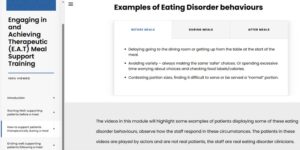 The specialist adult eating disorder unit completed a Quality Improvement (QI) project designed to enhance the dining room environment at mealtimes for patients and staff.
The specialist adult eating disorder unit completed a Quality Improvement (QI) project designed to enhance the dining room environment at mealtimes for patients and staff.
The ‘Dining Room QI project’ began in 2020 and led to two published papers (Gardner & Trueman, 2021; Gardner et al., 2022). Building on these findings, the team at Cotswold House, supported by a Health Education England grant developed the e-learning course in 2023. The training was shaped by stakeholder feedback, including experts by experience, and designed to improve staff confidence when supporting patients at mealtimes.
 The Engaging in and Achieving Therapeutic (E.A.T) Meal Support Training offers practical guidance on how to support patients before, during, and after meals, including video examples of good practice.
The Engaging in and Achieving Therapeutic (E.A.T) Meal Support Training offers practical guidance on how to support patients before, during, and after meals, including video examples of good practice.
Oxford Health staff should access the training internally via the Learning & Development portal – search for ‘Meal Support’ in the course catalogue. The training can be accessed by external staff only via Oxford Healthcare Improvement.
Mealtimes can be particularly challenging on inpatient eating disorder wards. The aim of the project was to create the most therapeutic and supportive environment possible, whilst reducing the number of eating disorder behaviours patients engaged in at mealtimes. The training includes clear explanations of common eating disorder behaviours and how to address them therapeutically. With six mealtimes a day on an inpatient unit, the potential impact of this training is significant for both patients and staff.
Cotswold House Oxford and Cotswold House Marlborough took part in a pilot of the training to evaluate the usability and validity. Specialist dietitian Sylvia Pyatt commented:
“We have received really positive feedback so far. It is so brilliant to see staff practice what they have learnt in the online training.”
Feedback from the pilot group was also encouraging:
“The training platform is easy to navigate and very engaging. It was very useful to hear experts by experience opinions and views on meal support as well.”
“I think this training is really great, well done! It is so great to have videos to watch and scenarios acted out. I think this will be really helpful for staff new to meal support and eating disorders, and staff who have worked in the field for a while but need a refresher, I really enjoyed doing this training.”
The project team believe that the skills developed from this training will benefit all clinicians working with eating disorder patients – including those in community services, step-care, intensive community teams, and clinicians supporting children and young people. The training includes short feedback forms at the beginning and end, and we welcome further comments and suggestions to help shape the next phase of development.
Research Assistant Alice Rorke added:
“We would like to recognise Cotswold House Oxford for their fantastic work and dedication to this project, as well as Cotswold House Marlborough and Oxford Health’s Quality Improvement Team for their support. Most importantly, we would like to thank all the experts by experience who gave their time to support this project – we are so proud of the collaborative work achieved.”
A special mention to Research Assistant Alice Rorke, Specialist Dietitian Sylvia Pyatt, Specialist Occupational Therapist Miriam Garcia, Professional Lead Dietitian Lucy Gardner, Research Lead Dr David Hunt, Quality Lead Ellen Tutisani, Quality & Safeguarding Manager Sharon Ryan, Clinical Psychologist Dr Layla Hamadi, Director Tom Lucas.
Published: 17 July 2025

